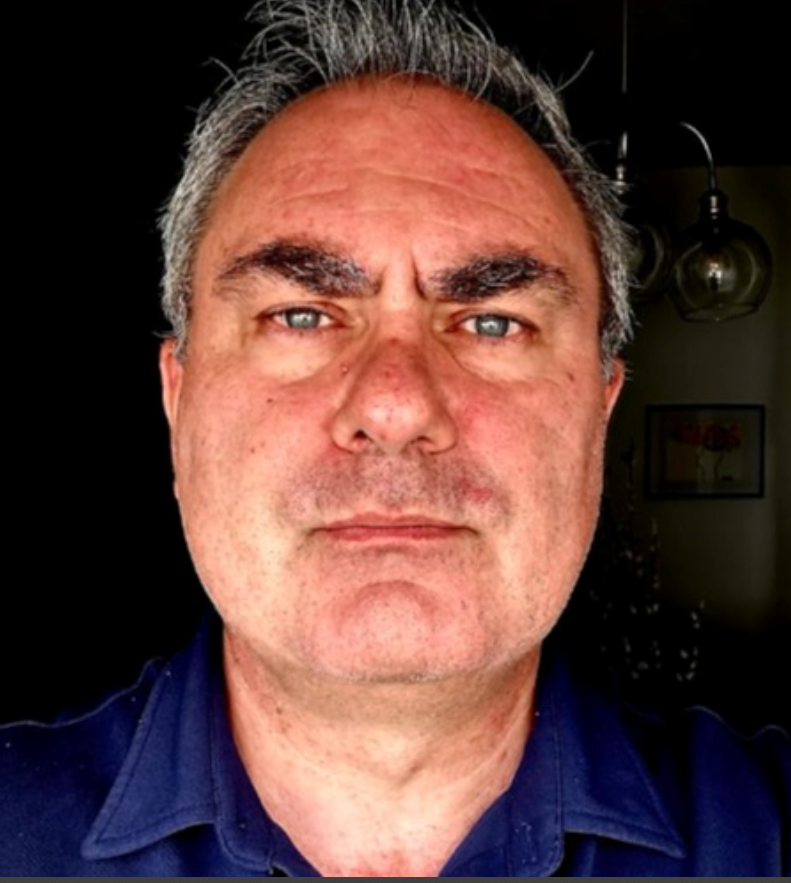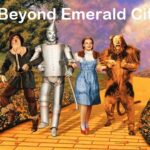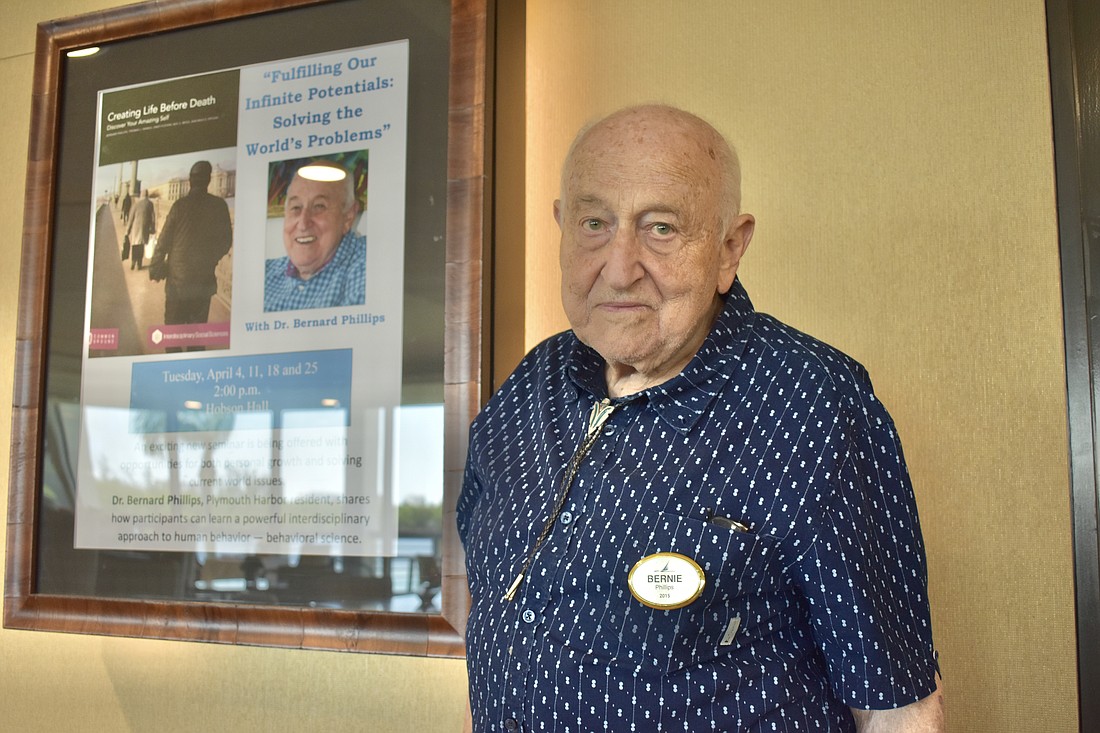![]()
Are You Prepared to Change Your Life?
Are You Ready to Change Our World?
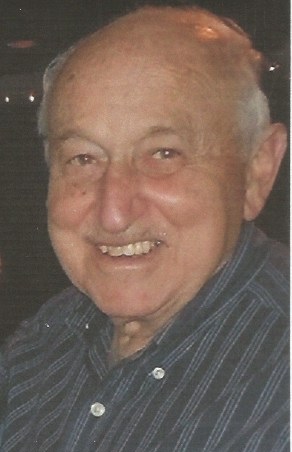
Dr. Bernard Phillips
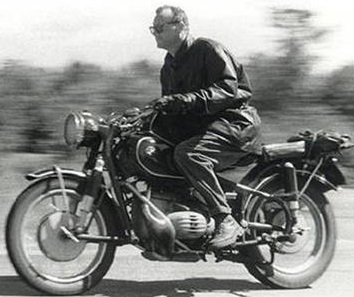
Mills’ interdisciplinary influence on me was illustrated by my doctoral dissertation on the power of self-image, developing a course on sociology through film, founding a Section of the American Sociological Association on Sociological Practice, editing diverse interdisciplinary manuscripts for two publishers, initiating the Sociological Imagination Group and editing the three volumes it produced over nine years, employing a mathematical model yielding high correlations within research on occupational choice, and developing a book followed by a series of articles centered on the power of integrated knowledge for yielding individual evolution.
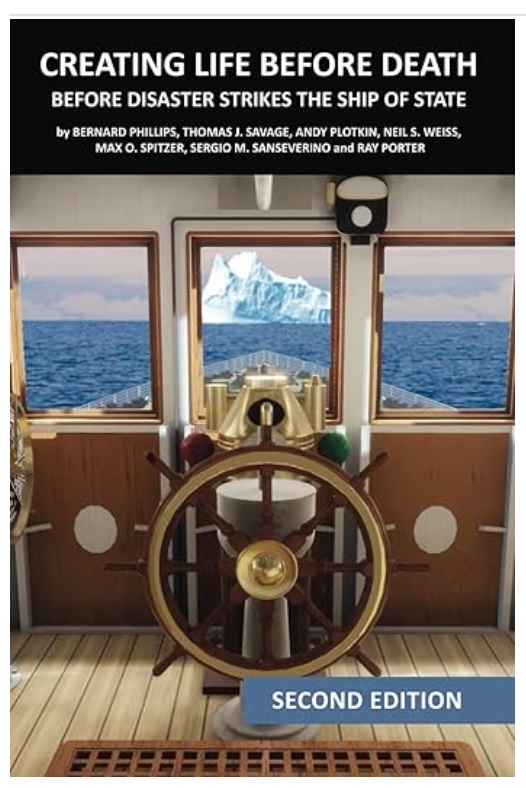 Retiring in Sarasota, Florida, I found myself in front of a Barnes & Noble bookstore, where I met Tom Savage. In pleasant conversation we discovered we had both been at Boston University in the early 1960s. I was teaching sociology in the College of Liberal Arts, while at the same time next door Tom was attending seminary at the School of Theology. Recognizing that a Scholar and a Preacher bring unique perspectives to any investigation about the meaning and significance of life, we decided to collaborate on writing Creating Life Before Death: Discover Your Amazing Self (2020). This was the book I’d been writing with Andy Plotkin, my former student, and two friends, Neal Weiss and Max Spitzer. Over time, we developed, with the aid of Sergio Sanseverino and Ray Porter, a 2nd edition published in 2024: Creating Life Before Death: Before Disaster Strikes the Ship of State.
Retiring in Sarasota, Florida, I found myself in front of a Barnes & Noble bookstore, where I met Tom Savage. In pleasant conversation we discovered we had both been at Boston University in the early 1960s. I was teaching sociology in the College of Liberal Arts, while at the same time next door Tom was attending seminary at the School of Theology. Recognizing that a Scholar and a Preacher bring unique perspectives to any investigation about the meaning and significance of life, we decided to collaborate on writing Creating Life Before Death: Discover Your Amazing Self (2020). This was the book I’d been writing with Andy Plotkin, my former student, and two friends, Neal Weiss and Max Spitzer. Over time, we developed, with the aid of Sergio Sanseverino and Ray Porter, a 2nd edition published in 2024: Creating Life Before Death: Before Disaster Strikes the Ship of State.
On page 1 we state our double crisis: “The first crisis asks us: How can we hope to live a truly meaningful life before our deaths? . . . How can the human race possibly survive?”
On page 4 we preview our solution: “Addressing our double crisis, people have failed to understand that a direction for resolving the first one, achieving a meaningful life, can yield a solution for the second one, solving our escalating problems. It is the further development of the individual that is the basis for the continued evolution of society.
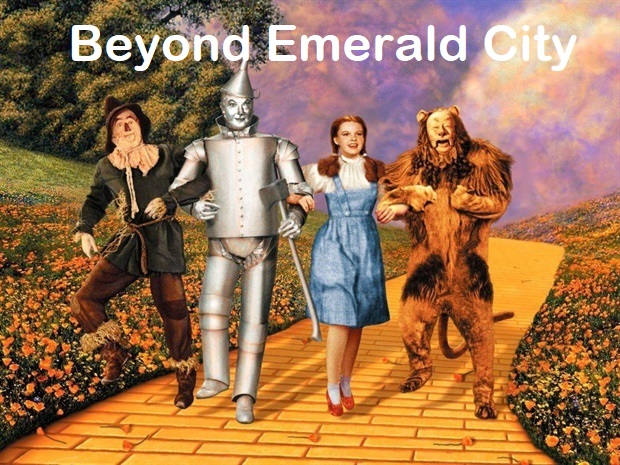 “Attention must be paid to the individual’s awesome possibilities for continuing to grow intellectually, emotionally, and in problem-solving abilities throughout life.” This idea of a focus on one’s “head,” “heart” and “hand” is later illustrated in the film, “The Wizard of Oz,” by the journey of the Scarecrow, Tin Man and Lion—along with Dorothy on the yellow brick road (page 11).
“Attention must be paid to the individual’s awesome possibilities for continuing to grow intellectually, emotionally, and in problem-solving abilities throughout life.” This idea of a focus on one’s “head,” “heart” and “hand” is later illustrated in the film, “The Wizard of Oz,” by the journey of the Scarecrow, Tin Man and Lion—along with Dorothy on the yellow brick road (page 11).
A book I’d written in 2014, Personal Evolution through Film: “The Wizard of Oz,” “Star Trek,” “Wild Strawberries” and “Wizard of Oz 2” views their journey on the yellow brick road beyond Emerald City. They are joined by the Munchkins, with the yellow brick road centered on personal evolution becoming their new home. Dorothy sings, “I’m way above the chimney tops, Far from all those fancy shops, That’s where you’ll find me. Birds fly over the rainbow, If they can, then so can I”.
Given the newness of our vision in Creating Life Before Death as well as the fundamental changes it points to, we felt it essential to write a series of nine articles emphasizing and explaining its key ideas. The first two were invited essays by the journal, Contemporary Sociology: “Sociology’s Next Steps?” (July 2019), and “Sociology’s Next Steps? 50th Anniversary of Gouldner’s Vision and 60th of Mills’ Vision,”(May 2020). These were followed by “Countering the Threats to Democracy” (2021), “Beyond Bureaucracy” (November 2023), “Toward Personal and World Evolution” (June 2024), “My Academic Journey (July 2024), “Paradigmatic Sociology” (August 2024), “Personal Evolution” (October 2024) and “How to Save the World” (December 2024).
My current efforts, which emphasize developing “Individual Evolution” as a powerful new social movement, point in several directions. I’m giving a workshop at Plymouth Harbor in Sarasota the week of January 20th, available on YouTube via my website, behavioral-scientists.com. I’m also communicating these ideas with well-known individuals like TV anchors. For example, the film director Francis Ford Coppola, when interviewed by Stephen Colbert on the Late Show about his new film, Megalopolis, shared my own optimism about the human potential. He sees all of us as potential geniuses. By learning to fulfill that potential we can avoid moving into dictatorships and learn to solve our mammoth problems.
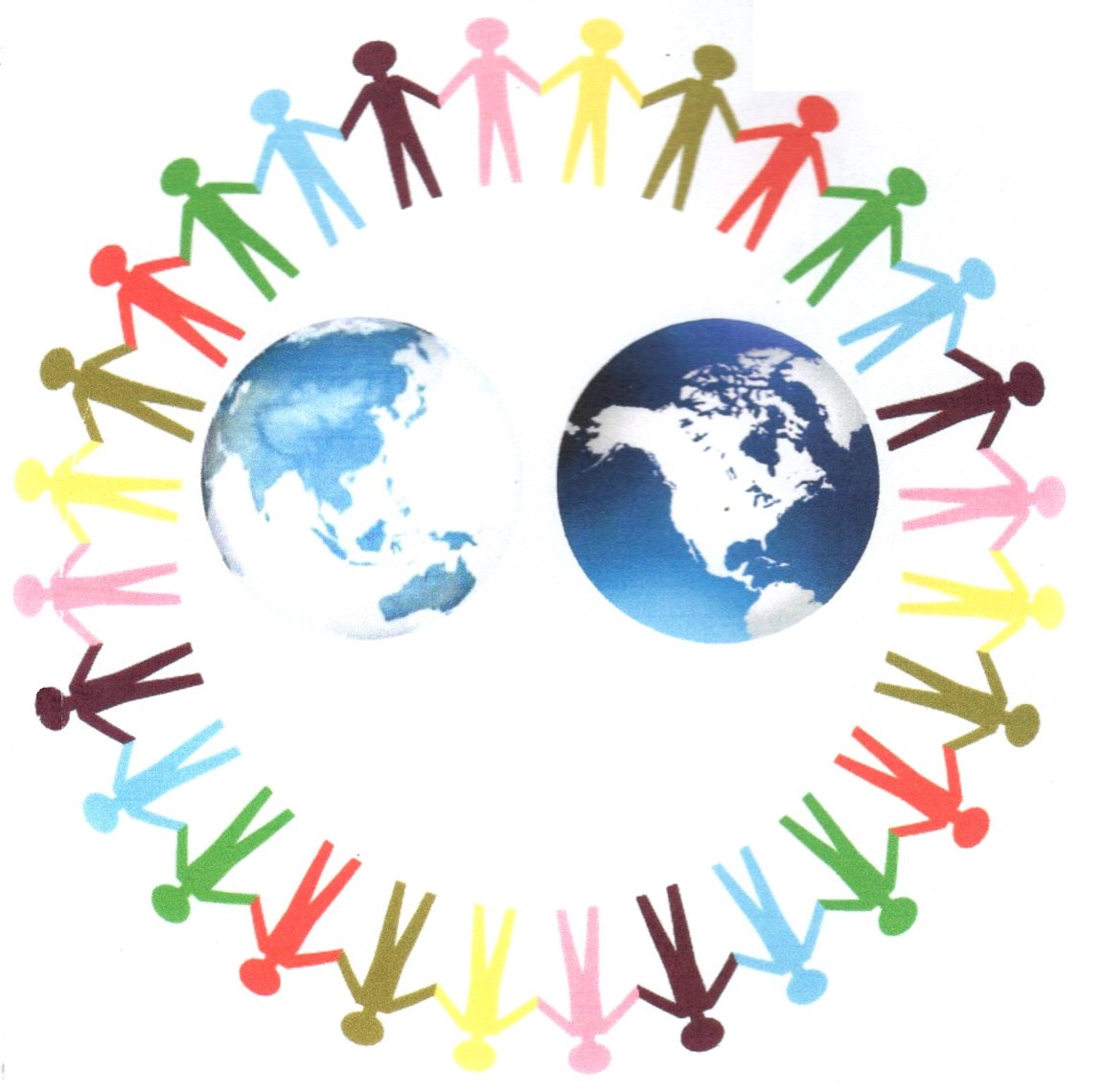
In addition, I’m working with my co-authors and several others on developing a curriculum that will help people work toward that goal of solving the first crisis of personal fulfillment and, as a result, address the second crisis of solving world problems. It will be freely available on my website, behavioral-scientists.com. Following that curriculum will require deep personal commitment on the part of the individual. Yet the results it promises are what we all desperately need at this time in history. I invite anyone and everyone interested in pursuing this vision to write me at bernie@behavioral-scientists.com. We all need nothing less than a worldwide social movement, as depicted below
Our book, Creating Life Before Death: Before Disaster Strikes the Ship of State, 2nd edition, proposes a solution to increasing worldwide problems. It is based on the idea that every single one of us, standing on the shoulders of giants, has potentials just waiting to be released. Moving beyond our bureaucratic way of life with its focus on hierarchy, narrow specialization and conformity, we can learn to achieve our own continuing personal and world evolution. We point the reader away from bureaucratic habits and toward evolutionary habits. With the aid of interdisciplinary scientific knowledge, we can escape from imprisonment in the iron cage of bureaucracy. We are proposing a new paradigmatic vision that unites existing knowledge of human behavior. We propose to create a world that we’ve never even dared to imagine would be possible.

How to Save the World:
Toward A New
Social Movement –
“Individual Evolution”
Latest Published Article
Abstract:
We begin with understanding THE BASIC PROBLEM humanity faces, a prerequisite for developing a solution. It is our bureaucratic way of life, with its focus on hierarchy, narrow specialization and personal conformity, that prevents us from fulfilling our evolutionary potential.
As a result, given the recent invention of weapons of mass destruction, we are poised to destroy ourselves and become just another life form which has become extinct. Our individualistic and small two-legged great ape ancestors had to form bureaucratic groups for protection when they were forced to come down from the trees in Africa due to declining foliage. For they were confronted by large, powerful and swift four-legged predators. We continue with an Evolutionary VISION for every single individual who walks the planet, by contrast with our having learned to see ourselves as very limited beings. However, it is possible for us to learn, over time, to adopt that vision, for we are nothing less than learning animals, and we’ve developed language as well as the scientific method.
What is essential, following the vision of the Buddha, is that we learn to reward ourselves ever more frequently and move toward an evolutionary way of life with its emphasis on equality, interdisciplinary understanding, and autonomy. However, to continue to move in these directions, given our lifetimes of having been brainwashed by our bureaucratic way of life, it is essential that we follow the idea invoked by an ancient Japanese proverb: “Vision without action is a daydream; action without vision is a nightmare.” What we require is vision with ACTION if we are to save the world. Following a previous book, Creating Life Before Death: Before Disaster Strikes
the Ship of State (2024, second edition), along with five previous ISAR articles —especially the most recent one published in October, 2024—the individual must learn to evolve. It is the further development of the individual that is the basis for the continued evolution of society. That October article listed ten ways in which anyone can learn to reinforce or reward oneself ever more frequently throughout one’s everyday life. This approach is simplified in the present article, making it much easier to employ, into simply (1) evolutionary perception, and (2) evolutionary action. By so doing, one builds on an evolutionary vision with momentary actions which transform oneself, enabling one to continue to evolve throughout one’s everyday life, and teach others to do the same. Those actions must include one’s mundane everyday activities. As a result, those mundane activities, which normally are perceived as trivial, become elevated as part of a nobler vision. They become part of one’s efforts to develop a widening social movement pointing toward individual evolution. Over time, the result can be nothing less than the trashing of our bureaucratic way of life. This approach to vision and action fulfills Polak’s and Busch’s understanding of what will make for a successful image of the future able to actually transform the future (READ MORE)

WORKSHOP
2025- The Launching Pad for your Inner-Journey;
Taking you to where no men has gone before
JANUARY 20th 2025
for more information contact us via email at:
bernie@behavioral-scientists.com
Proposal for a new Section of the American Sociological Association.
Paradigmatic Sociology
.
.
My purpose is nothing less than moving toward fulfilling Auguste Comte’s dream of a powerful science of sociology that can help societies solve their present-day highly threatening problems.
Thomas S. Kuhn’s The Structure of Scientific Revolutions explained the necessity of changing the paradigm, or absolutely fundamental assumptions, within a given science in order to achieve a scientific revolution, illustrated by the change from Newtonian to Einsteinian physics.
We sociologists can achieve much the same results by (1) becoming aware of the existence of our bureaucratic paradigm, with its focus on persisting hierarchy, narrow unintegrated specialization, and personal conformity, (2) working toward developing a vision of an alternative paradigm which opens up to the incredible potentials of the individual and society, and (3) demonstrating the actions required to fulfill that vision.
To the extent that sociology’s Sections presently embody a bureaucratic paradigm, I’m convinced that they will achieve their goals to an increasing extent by learning to move toward an alternative paradigm, such as an evolutionary one. This will be facilitated by interaction between members of the new Section and members of other Sections. Members of those Sections which have addressed in part the importance of paradigmatic change can speed this process along.
My own academic background, which has moved progressively in this direction, can serve to illustrate the nature of such a paradigmatic change.
As an undergraduate pre-medical student at Columbia, I changed to sociology after contact with C. Wright Mills and his commitment to working toward solving society’s problems with an exceedingly broad approach to sociology, by contrast with narrow specialization. Later, reading his The Sociological Imagination, I became convinced of the immense potential powers of the ordinary individual. My co-founding the Section on Sociological Practice pointed up the importance of action.
The textbooks I wrote in introductory sociology and in research methods gave me the intellectual background that Mills had pointed toward. That background was
extended by my editing book series on the sociological imagination for Aldine de Gruyter as well as Paradigm Publishers. The dissertation of my doctoral student, Andy Plotkin, pointed me in the right direction: “Toward the Measurement of Paradigms.”
This was followed by my co-founding the Sociological Imagination Group in 2000, initially based on my book, Beyond Sociology’s Tower of Babel: Reconstructing the Scientific Method. Over the next eight years our annual research conferences, joint with the meetings of the American Sociological Association, yielded three volumes (Toward a Sociological Imagination, Understanding Terrorism, and Bureaucratic Culture and Escalating World Problems) containing 30 articles.
The four books I published afterwards (The Invisible Crisis of Contemporary Society, Armageddon or Evolution?, Saving Society: Breaking Out of Our Bureaucratic Way of Life, and Revolution in the Social Sciences) all pointed toward an alternative paradigm for society. That worldview was explained more fully in Creating Life Before Death (2020), followed by two invited essays in Contemporary Sociology and my seminar on behavioral-scientists.com.
Currently there is interest in paradigms throughout the academic world, as illustrated by the following books: The Illusion of Knowledge: The Paradigm Shift in Aging Research, Paradigm Shifting: Guiding Evolution from the Inside, The Golden Paradigm, Love, Stars, and Paradigms, Paradigms: The Business, Paradigm Shifts, Paradigms: The Business of Discovering the Future, Social Research: Paradigms in Action, Change Your Paradigm: Change Your Life, Magic Box Paradigm, Unfuck Your Mental Health Paradigm, Paradigm, What They Don’t Tell You About Paradigms, Handbook for the New Paradigm, Paradigm: A Macro Manifesto to Food, The New Success Paradigm, and The Paradigm: The Accurate Blueprint that Holds the Mystery of Our Times.
These books all illustrate what Mills called for in his The Sociological Imagination: “The capacity to shuttle between levels of abstraction, with ease and with clarity, is a signal mark of the imaginative and systematic thinker.” It is by moving both far up the ladder of linguistic abstraction to a paradigmatic level, and then far down to concrete phenomena, that one opens up to the full range of available knowledge by academics and others. By so doing, we follow in the footsteps of Francis Bacon, who wrote, “I have taken all knowledge to be my province.” Yet it remains for sociologists to employ this approach to fulfill the vision of Auguste Comte. Our problematic times demand nothing less
Introduction to the Course
The foundation of this course lies in a transformative hypothesis: if humanity as a whole fulfills the first two levels of Maslow’s hierarchy of needs—Physiological and Safety needs—the levels of aggression and violence in society will drastically decrease. These basic needs are essential for stability and meeting them universally could shift our world toward greater harmony and cooperation.
To achieve this ambitious goal, we identify two key pathways:
- Government-Driven Support:
Governments can play a critical role by guaranteeing access to fundamental human rights such as food, clean water, sanitation, shelter, education, healthcare, public transportation, and safety. These provisions create a foundation for well-being and security, reducing the stress and desperation that often fuel violence and aggression. - Individual Empowerment Through Emotional Awareness:
Emotional scarcity—feelings of lack, inadequacy, and disconnection—lies at the root of much material scarcity. By addressing emotional scarcity, individuals can transform their mindset and behaviors, fostering emotional intelligence and resilience. This shift empowers people to take control of their lives, creating conditions to fulfill the first two tiers of the pyramid themselves while generating material abundance in the process.
This second pathway not only equips individuals with tools for personal success but also cultivates a spirit of solidarity and cooperation, encouraging communities to thrive together.
The Vision
The ideal solution combines these two approaches: government infrastructure creating opportunities for all, alongside empowered individuals actively contributing to their own growth and that of their communities. Together, these forces can pave the way for an Evolutionary Way of Life, replacing outdated systems that prioritize bureaucracy over human flourishing.
This course is designed to guide you on a personal journey to uncover and address emotional scarcity in your own life, helping you build emotional intelligence and create the material stability you seek. Through reflection, practice, and new insights, you will develop the tools to achieve balance and abundance—not just for yourself, but as part of a greater movement toward a more compassionate and sustainable world.
Welcome to the start of an empowering journey!
From Emotional Scarcity to Abundance
Welcome to From Emotional Scarcity to Abundance, a transformative journey where we uncover how emotional and material scarcity are deeply interconnected—and how resolving one can lead to the resolution of the other. This course is designed to guide you toward a life of abundance, peace, and fulfillment, not just within yourself but in your relationships and the world around you.
THE CHANGE STARTS WITHIN
(The Observer article by Ian Swaby April 30, 2023
For the second year in a row, Phillips is offering a series of four weekly lectures at Plymouth Harbor’s Hobson Hall auditorium. The lectures series is called “Fulfilling Our Infinite Potentials: Solving the World’s Problems” and is based on a book that he co-authored, “Creating Life Before Death: Discover Your Amazing Self.”
Bernie Phillips
Dr. Bernard Phillips

Mills’ interdisciplinary influence on me was illustrated by my doctoral dissertation on the power of self-image, developing a course on sociology through film, founding a Section of the American Sociological Association on Sociological Practice, editing diverse interdisciplinary manuscripts for two publishers, initiating the Sociological Imagination Group and editing the three volumes it produced over nine years, employing a mathematical model yielding high correlations within research on occupational choice, and developing a book followed by a series of articles centered on the power of integrated knowledge for yielding individual evolution.
 Retiring in Sarasota, Florida, I found myself in front of a Barnes & Noble bookstore, where I met Tom Savage. In pleasant conversation we discovered we had both been at Boston University in the early 1960s. I was teaching sociology in the College of Liberal Arts, while at the same time next door Tom was attending seminary at the School of Theology. Recognizing that a Scholar and a Preacher bring unique perspectives to any investigation about the meaning and significance of life, we decided to collaborate on writing Creating Life Before Death: Discover Your Amazing Self (2020). This was the book I’d been writing with Andy Plotkin, my former student, and two friends, Neal Weiss and Max Spitzer. Over time, we developed, with the aid of Sergio Sanseverino and Ray Porter, a 2nd edition published in 2024: Creating Life Before Death: Before Disaster Strikes the Ship of State.
Retiring in Sarasota, Florida, I found myself in front of a Barnes & Noble bookstore, where I met Tom Savage. In pleasant conversation we discovered we had both been at Boston University in the early 1960s. I was teaching sociology in the College of Liberal Arts, while at the same time next door Tom was attending seminary at the School of Theology. Recognizing that a Scholar and a Preacher bring unique perspectives to any investigation about the meaning and significance of life, we decided to collaborate on writing Creating Life Before Death: Discover Your Amazing Self (2020). This was the book I’d been writing with Andy Plotkin, my former student, and two friends, Neal Weiss and Max Spitzer. Over time, we developed, with the aid of Sergio Sanseverino and Ray Porter, a 2nd edition published in 2024: Creating Life Before Death: Before Disaster Strikes the Ship of State.
On page 1 we state our double crisis: “The first crisis asks us: How can we hope to live a truly meaningful life before our deaths? . . . How can the human race possibly survive?”
On page 4 we preview our solution: “Addressing our double crisis, people have failed to understand that a direction for resolving the first one, achieving a meaningful life, can yield a solution for the second one, solving our escalating problems. It is the further development of the individual that is the basis for the continued evolution of society.
 “Attention must be paid to the individual’s awesome possibilities for continuing to grow intellectually, emotionally, and in problem-solving abilities throughout life.” This idea of a focus on one’s “head,” “heart” and “hand” is later illustrated in the film, “The Wizard of Oz,” by the journey of the Scarecrow, Tin Man and Lion—along with Dorothy on the yellow brick road (page 11).
“Attention must be paid to the individual’s awesome possibilities for continuing to grow intellectually, emotionally, and in problem-solving abilities throughout life.” This idea of a focus on one’s “head,” “heart” and “hand” is later illustrated in the film, “The Wizard of Oz,” by the journey of the Scarecrow, Tin Man and Lion—along with Dorothy on the yellow brick road (page 11).
A book I’d written in 2014, Personal Evolution through Film: “The Wizard of Oz,” “Star Trek,” “Wild Strawberries” and “Wizard of Oz 2” views their journey on the yellow brick road beyond Emerald City. They are joined by the Munchkins, with the yellow brick road centered on personal evolution becoming their new home. Dorothy sings, “I’m way above the chimney tops, Far from all those fancy shops, That’s where you’ll find me. Birds fly over the rainbow, If they can, then so can I”.
Given the newness of our vision in Creating Life Before Death as well as the fundamental changes it points to, we felt it essential to write a series of nine articles emphasizing and explaining its key ideas. The first two were invited essays by the journal, Contemporary Sociology: “Sociology’s Next Steps?” (July 2019), and “Sociology’s Next Steps? 50th Anniversary of Gouldner’s Vision and 60th of Mills’ Vision,”(May 2020). These were followed by “Countering the Threats to Democracy” (2021), “Beyond Bureaucracy” (November 2023), “Toward Personal and World Evolution” (June 2024), “My Academic Journey (July 2024), “Paradigmatic Sociology” (August 2024), “Personal Evolution” (October 2024) and “How to Save the World” (December 2024).
My current efforts, which emphasize developing “Individual Evolution” as a powerful new social movement, point in several directions. I’m giving a workshop at Plymouth Harbor in Sarasota the week of January 20th, available on YouTube via my website, behavioral-scientists.com. I’m also communicating these ideas with well-known individuals like TV anchors. For example, the film director Francis Ford Coppola, when interviewed by Stephen Colbert on the Late Show about his new film, Megalopolis, shared my own optimism about the human potential. He sees all of us as potential geniuses. By learning to fulfill that potential we can avoid moving into dictatorships and learn to solve our mammoth problems.

In addition, I’m working with my co-authors and several others on developing a curriculum that will help people work toward that goal of solving the first crisis of personal fulfillment and, as a result, address the second crisis of solving world problems. It will be freely available on my website, behavioral-scientists.com. Following that curriculum will require deep personal commitment on the part of the individual. Yet the results it promises are what we all desperately need at this time in history. I invite anyone and everyone interested in pursuing this vision to write me at bernie@behavioral-scientists.com. We all need nothing less than a worldwide social movement, as depicted below

When I Begin the Ancient Game of Chess
by Bernard Phillips
When I begin the ancient game of chess,
Commanding knights and pawns in bitter strife,
I wonder at the thought that I possess:
How is it with the greater game of life?
Am I a wooden piece which someone moves,
A means to satisfy another’s ends?
Do I advance, retreat, in patterned grooves,
A creature of commands another sends?
Perhaps I am a player in the game,
And force the moves of countless other souls
To seek my own fulfillment, fortune, fame,
Ignoring in my quest their secret goals.
The castle falls, the knights remain en pris [exposed],
Besiegers there are none the eye can see.
Different: A Voice of the Atomic Age, 8, 2, Summer, 1954, 18.
Tom Savage
Tom’s unique background combines 25 years as a minister and 23 years with the Sarasota, Florida, Sheriff’s Department, where he retired as a lieutenant. He served churches in Belmont, Massachusetts, where he was ordained, and in Elgin, Illinois, Madison, Wisconsin, and Sarasota, Florida. Moving from pulpit to patrol car, the robe and badge provided experiences granted very few of us. They have yielded numerous stories found in this book.
Attempting to rise above the biased cultural contamination of one’s own personal experiences in his native land, Tom has traveled to over eighty-nine countries, studying local traditions and beliefs. The goal he sought was an appreciation of unity within diversity, while championing individuality in community.
Tom sees art as history’s mirror, both reflecting and helping to interpret our human condition. Throughout the ages, art has been represented by a variety styles. These styles merely indicate an artist’s unique way for seeing our world. Our imaginations are expanded as their visions are presented to us in paintings, sculptures and crafts. Tom views the physical and social sciences as feeding the head, with art, architecture and music emotionally touching the heart
Tom was deeply moved by a writer who saw each of us being “tossed into the world.” The implications of that image were quite profound. Time, Place, and Condition are the realities we all face. For Time, what would one’s life be to have been “tossed into the world” in the first or fifteenth century, versus our own twenty-first century? For Place, how would we have turned out having been “tossed” into China, India, Arabia, or the Middle East? How would the cultural contamination of these areas have shaped our views on politics, religion, values and behavior? For Condition, the list is endless! Are you white, black, or brown in color? Male or female? Rich or poor? Free or slave? All of this determines how we see ourselves, our neighbors, and the world.
Tom holds a B.A. from the University of Redlands, California, and a Master of Divinity and Master of Sacred Theology Degree from the Boston University School of Theology. He created a unique experiment in community policing with over ten thousand volunteers for a citizen patrol. He has served as the founder of the Sarasota Public Arts Fund, on the Ringling College Scholarship Committee, and is a significant donor for philanthropic causes in the area.
A River of Time flows into an Ocean of Life creating our human condition. So many people out there in our world with differing ideas, beliefs, and values. Is it any wonder that others will not like us simply because they are not like us?
Tom enjoyed portraying himself to the public in three distinctive roles: cop, cowboy, and clergyman. There was, of course, a brief motorcycler, biker, “Captain America” period, when he made the obli gatory cross-country road trip from Florida to California.
But then, each of us has a story to share. Here you reveal your values, and at some point you pause to ask yourself what life is really all about.
Over the years you finally realized you were wiser than you thought, stronger than you recognized, and braver than you felt. In life, your voice and vote will count!
Don’t just sit in the bleachers, watching others play the game of life. Those active on the field will end up making all the rules you will later be forced to obey.
“Shop until you drop” says “to be is to have.” Gambling is just another form of escape. Neither activity will make you a true winner. With growth and change as the only inevitable realities in life, we must rise to meet the challenges they present.
Caught between a vanished past and an unknown future, let’s celebrate a joyful and creative life before our death.
READER – How do you FEEL about the IDEAS suggested in my poem, “THE LEAF”?
The Leaf
by Tom Savage
 Here am I. Once supple, smooth, alive Now rigid, coarse, dying. Soon to drift quietly to the ground where expectant seedlings Greedily await my life-giving death. Those gentle breezes who Yesterday fondly caressed me. Now would rip me. From my mother’s limbs, sending me. Tumbling down to be trodden under foot. Raked, piled, leaped upon in childhood’s delight. Gathered and burned. The wind will aid a few in escape. But all such evasion an illusion. For the decree is quite simple: New leaves from old. Now, it is my turn. Behold, I am coming. Let all the earth rejoice.
Here am I. Once supple, smooth, alive Now rigid, coarse, dying. Soon to drift quietly to the ground where expectant seedlings Greedily await my life-giving death. Those gentle breezes who Yesterday fondly caressed me. Now would rip me. From my mother’s limbs, sending me. Tumbling down to be trodden under foot. Raked, piled, leaped upon in childhood’s delight. Gathered and burned. The wind will aid a few in escape. But all such evasion an illusion. For the decree is quite simple: New leaves from old. Now, it is my turn. Behold, I am coming. Let all the earth rejoice.
Andy Plotkin
For someone who would eventually teach courses ranging from the sociology of developing countries and family and society, I had the perfect parents to prepare me for an interdisciplinary life. My father was a world-class track star and a physics major at Harvard. He then became the president of his father’s clothing store in Boston. My mother was a renowned artist who realized that to be human is a proud achievement.
My crowning achievements have been my steadfast marriage to my graduate school sweetheart, and the upbringing of our two fabulous children. Next to these achievements, I am hoping to contribute to the mitigation of the two major interrelated worldwide crises of our era: creating more meaningful personal lives, and taking steps toward solving the world’s most pressing social problems, ranging from bullying, racism (and all the other isms), poverty (and all other forms of inequality), terrorism, environmental degradation, and war.
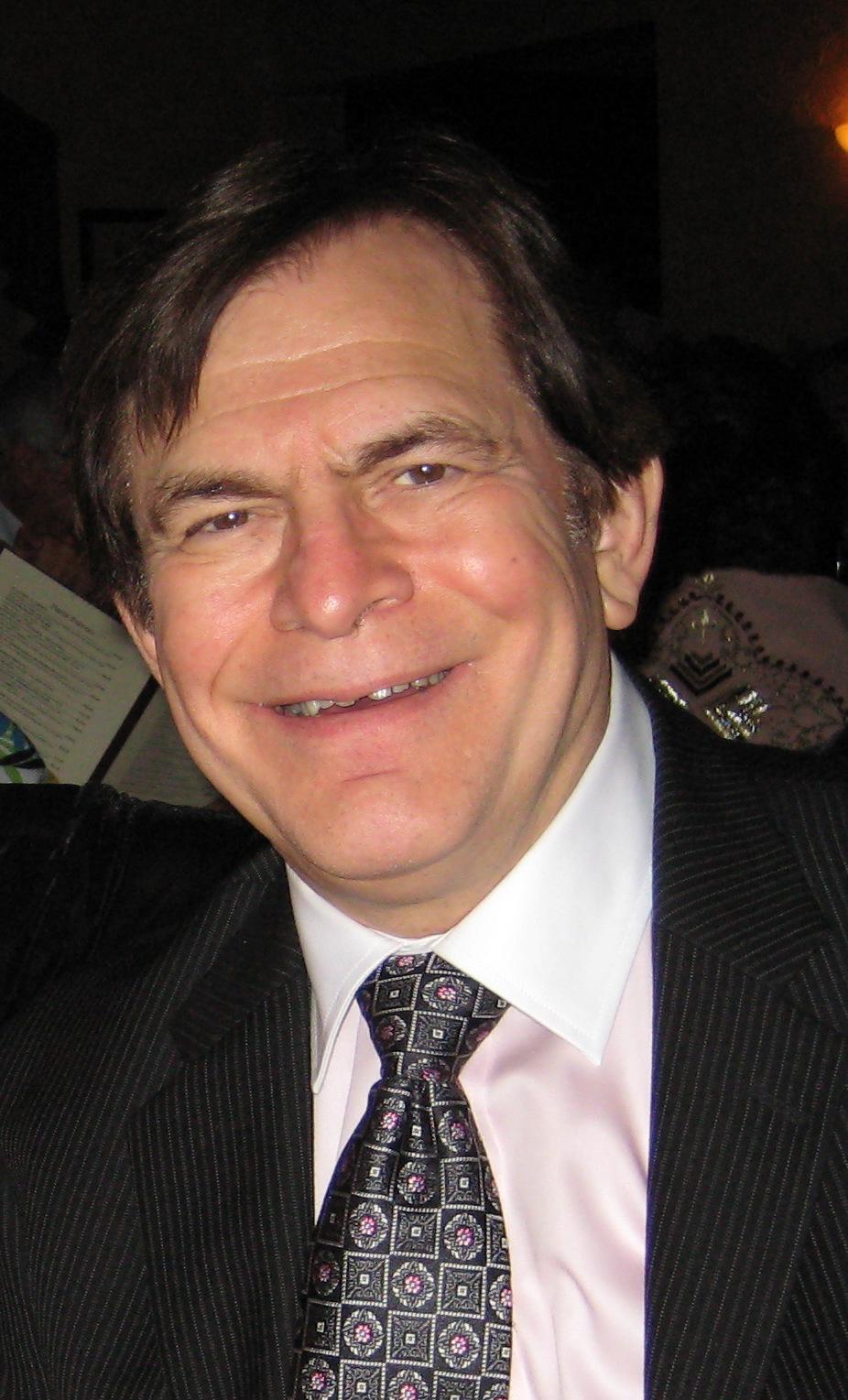
Neil Weiss
Professor at Strayer University
Sergio Sanseverino
Sergio Marcelo Sanseverino, an international entrepreneur and accomplished chemist with a remarkable three decades of expertise in the pharmaceutical industry. Born in the vibrant city of Buenos Aires, Argentina in 1970, Sergio later embarked on a journey that led him to the United States, where he assumed the pivotal role of Chief Chemist. In this capacity, he successfully orchestrated global operations across Asia, Eastern and Western Europe, as well as the Americas.
Sergio’s professional journey is characterized by a rich intercultural background, providing him with a unique perspective on diverse sociological realities. This, coupled with his extensive technical and business acumen, has significantly contributed to Dr. Phillips’ endeavors over the past four years, adding a valuable dimension to their collaborative work. Sergio Marcelo Sanseverino continues to leave an indelible mark on the intersection of entrepreneurship, chemistry, and global leadership.
